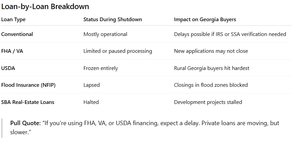What every buyer, seller, and investor should know about loan delays, market uncertainty, and local effects.
Introduction
The federal government shutdown that began October 1, 2025 may feel like just another round of Washington politics — but its ripple effects reach all the way to Georgia’s housing market.
From delayed mortgage approvals to frozen flood insurance and disrupted SBA lending, this political pause can hit real people’s wallets. Let’s break down how the shutdown impacts Georgia homeowners, investors, and real-estate professionals — and what you can do to stay ahead.
Georgia-Specific Impacts
1. Federal Paychecks, Local Consequences
Roughly 110,000+ federal employees in Georgia are affected by furloughs or delayed paychecks (Georgia Department of Labor).
That means less consumer confidence — and fewer buyers ready to pull the trigger on new homes.
Pull Quote: “When confidence drops, closings stall. Even a few weeks of paycheck disruption can ripple through the local market.”
Atlanta, Warner Robins, and Augusta — all home to major federal employers — are likely to feel these slowdowns first.
2. Construction and Federal Projects on Hold
Shutdowns halt or delay federally funded construction contracts, estimated to cost Georgia around $300 million per month in lost payments (McCormick House Report).
That affects infrastructure, development, and private subcontractors — slowing down both new builds and revitalization efforts across the state.
3. SBA Loans: Frozen for Now
If you’re renovating or acquiring investment property through an SBA-backed loan, hit pause — the Small Business Administration has stopped guaranteeing new loans during the shutdown (WSB-TV).
For investors and small-business developers, this means cash flow bottlenecks and delayed closings.
4. Social Programs and Housing Assistance
Funding uncertainty for WIC and SNAP has Georgia’s most vulnerable families on edge (Axios Atlanta).
While local housing authorities continue operations for now, extended federal inaction could limit voucher or Section 8 disbursements — affecting landlords and tenants alike.
How It’s Affecting the Real Estate Market
Deal Delays and Disruptions
Shutdowns slow or stall several key functions:
Flood insurance from NFIP cannot be issued or renewed (NAHB).
IRS verifications (Form 4506-T) are delayed.
Environmental permitting and HUD reviews are paused.
FHA, VA, and USDA loans face processing backlogs or full suspensions.
That’s a perfect storm for delayed closings — especially in areas with flood-zone properties or government-backed buyers.
Market Mood in Georgia
Georgia REALTORS® report growing buyer hesitation and more “wait-and-see” sentiment.
Nationwide, 1 in 6 Americans are delaying major purchases like homebuying during the shutdown (Newsweek).
On the bright side, mortgage rates could dip slightly as investors move toward safer Treasury bonds — but that advantage means little if your loan can’t close on time.
Smart Moves for Buyers, Sellers & Investors
1. Stay Flexible
Keep timelines loose. Expect at least 2-3 weeks of potential delay for federally related processes.
2. Get Creative With Financing
Ask lenders about bridge loans or “close at risk” options to keep deals alive.
3. Prioritize Non-Flood-Zone Properties
Until NFIP renewals resume, flood-zone properties could sit on the market longer.
4. Prep Buyers & Sellers Early
If you’re an agent, be proactive — communicate expected delays, explain why, and set realistic expectations.
5. Follow Local Data
Keep an eye on inventory, DOM, and list-to-sale ratios. Georgia’s local dynamics often diverge from national headlines.
Big Picture: What Happens Next
If this shutdown ends quickly, the market bounce-back should be swift — mostly catching up on delayed deals.
But if it drags on, expect more tangible economic stress: stalled construction, tighter lending, and slower absorption rates in both residential and commercial sectors.
Congress could restore programs like NFIP and SBA guarantees retroactively, which would clear backlogs fast — but no one knows when that’ll happen.
Final Thoughts
The federal shutdown may be temporary, but it reminds us that real estate runs on confidence, clarity, and cash flow. For Georgia agents and investors, staying informed and adaptable is key.
At Modern Heart Realty, we believe knowledge creates confidence. Whether you’re navigating a first-time home purchase or structuring a complex investment deal, our team can help you move forward — even when Washington stands still.


